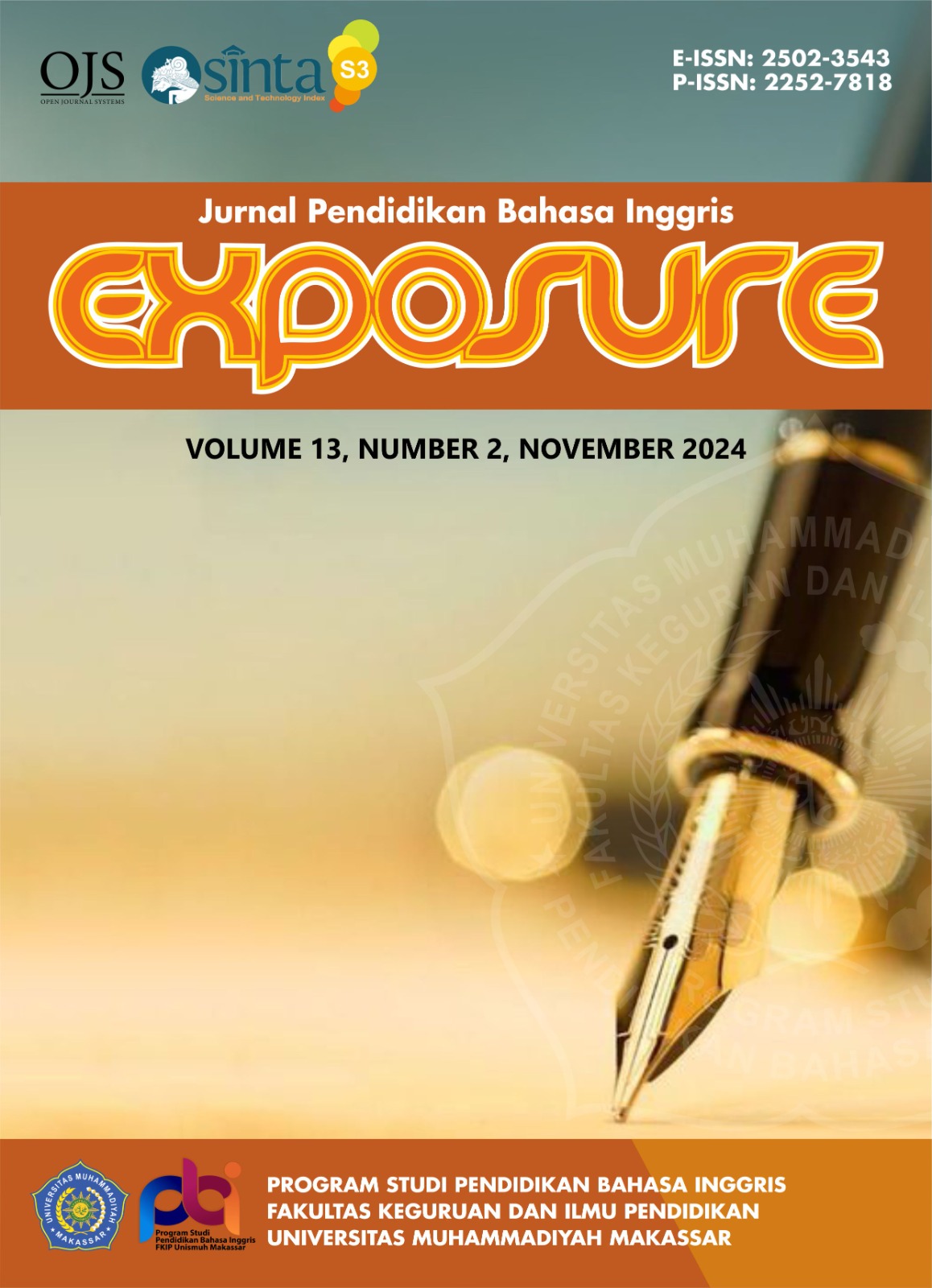COOPERATIVE LEARNING IN TEACHING READING: How does the English teacher perceive cooperative learning?
DOI: https://doi.org/10.26618/exposure.v13i2.17344
Cooperative Learning, Reading Skill, Teachers’ Perception
Abstract
Learning to read is not merely a classroom requirement; it is a skill that empowers individuals, enabling them to navigate the complexities of the world and fostering a lifelong love for learning. The objectives of this research are formulated to investigate the English teacher of perception about cooperative learning. The study employed a case study research approach. A case study is a method used to gain a comprehensive comprehension of a subject or event in an authentic environment. The result study shows that The effectiveness of a teaching method is contingent upon various factors, including the specific context, learning objectives, and the preferences of both teachers and students. While cooperative learning has demonstrated efficacy in numerous scenarios, it is recognized that alternative methods may also be suitable depending on the unique needs and characteristics of the class. This highlights the value of educators being open to exploring and adapting different instructional strategies to best meet the requirements of their students.
References
Albert J. Harris and Edward R. Sipay. (1980). How to Increase Reading Ability. New York & London: Longman.
Brown, H. D., & Abeywickrama, P. (2010). Language Assessment, Principles and Classroom Practices, Second Edition. In Sifonoforos (Vol. 1, Issue August 2015). Person Longman.
Coombs, H. (2022). Case Study Research Defined [White Paper].
Cresswell, J. W. (2009). Research Design: Qualitative, quantitative, and mixed methods approaches. London: SAGE Publications Ltd.
Erbil, D. G. (2020). A review of flipped classroom and cooperative learning method within the context of Vygotsky theory. Frontiers in psychology, 11, e1157.
Gillies, R. M. (2007). Cooperative Learning: Integrating Theory and Practice. SAGE Publications.
Hernández-Sellés, N., Muñoz-Carril, P. C., & González-Sanmamed, M. (2019). Computer-supported collaborative learning: An analysis of the relationship between interaction, emotional support and online collaborative tools. Computers & Education, 138, 1-12.
Hornby, A. S. (1995). Oxford Advanced Learner’s Dictionary. USA: Oxford University Press.
Jacobs, G. M., Power, M. A., Loh, W. I. (2002). The teacher's sourcebook for cooperative learning: Practical techniques, basic principles, and frequently asked questions. Thousand Oaks, CA: Corwin Press.
Kagan, S. (1994). Cooperative Learning. Kagan Publishing.
Richards, J. C. and Rogers. (2001). Approaches and Methods in Language Teaching (2nd Ed.). New York: Cambridge University Press.
Richards, J.C. and Scmidt, R. (2018). Longman dictionary of language teaching and applied linguistics (3rd Ed.). Harlow: pearson Education Limited.
Saovappa, Wichadee. 2003. The Effects of Cooperative Learning on English Reading Skills and Attitudes of the First-Year Students at Bangkok University. Bangkok: BU Academic Review.
Slavin, R. E. (1995). Cooperative learning: Theory, research, and practice. Boston: Allyn & Bacon.
Slavin, R. E. (2014). Educational Psychology: Theory and Practice. Pearson Education.
Smulowitz, S. (2017). Interview Guide. In J. Matthes (Ed.), The International Encyclopedia of Communication Research Methods (J. Matthes, Ed.; C. S. Davis & R. F. Potter, Associate Eds.). John Wiley & Sons, Inc.
Tarigan, H. G. 1990. Pengajaran kompetensi bahasa. Edisi Revisi. Bandung: Angkasa.
Tran, V. D. (2019). Does cooperative learning increase students' motivation in learning?. International Journal of Higher Education, 8(5), 12-20.
Webb, N. M. (2009). The Teacher's Role in Promoting Collaborative Dialogue in the Classroom. British Journal of Educational Psychology, 79(1), 1-28.
Downloads
Published
How to Cite
Issue
Section
License
Authors who publish with this journal agree to the following terms:
In order to assure the highest standards for published articles, a peer review policy is applied. In pursue of the compliance with academic standards, all parties involved in the publishing process (the authors, the editors and the editorial board and the reviewers) agree to meet the responsibilities stated below in accordance to the Journal publication ethics and malpractice statement.
Duties of Authors:
- The author(s) warrant that the submitted article is an original work, which has not been previously published, and that they have obtained an agreement from any co-author(s) prior to the manuscript’s submission;
- The author(s) should not submit articles describing essentially the same research to more than one journal;
- The authors(s) make certain that the manuscript meets the terms of the Manuscript Submission Guideline regarding appropriate academic citation and that no copyright infringement occurs;
- The authors(s) should inform the editors about any conflict of interests and report any errors they subsequently, discover in their manuscript.
Duties of Editors and the Editorial Board:
- The editors, together with the editorial board, are responsible for deciding upon the publication or rejection of the submitted manuscripts based only on their originality, significance, and relevance to the domains of the journal;
- The editors evaluate the manuscripts compliance with academic criteria, the domains of the journal and the guidelines;
- The editors must at all times respect the confidentiality of any information pertaining to the submitted manuscripts;
- The editors assign the review of each manuscript to two reviewers chosen according to their domains of expertise. The editors must take into account any conflict of interest reported by the authors and the reviewers.
- The editors must ensure that the comments and recommendations of the reviewers are sent to the author(s) in due time and that the manuscripts are returned to the editors, who take the final decision to publish them or not.
Authors are permitted and encouraged to post online a pre-publication manuscript (but not the Publisher’s final formatted PDF version of the Work) in institutional repositories or on their Websites prior to and during the submission process, as it can lead to productive exchanges, as well as earlier and greater citation of published work (see The Effect of Open Access). Any such posting made before acceptance and publication of the Work shall be updated upon publication to include a reference to the Publisher-assigned DOI (Digital Object Identifier) and a link to the online abstract for the final published Work in the Journal.














